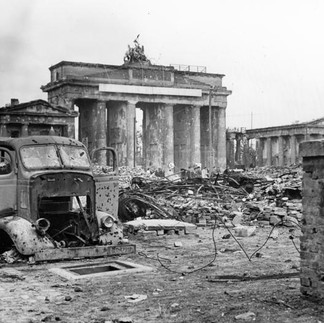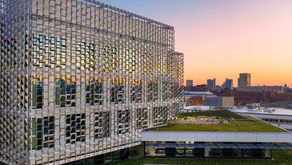Berlin Diaries
- isabossav

- Dec 2, 2021
- 5 min read
Updated: Jun 22, 2024
After taking a longer than anticipated hiatus from writing, I am back! In all fairness, it's been a whirlwind - I uprooted 8 years of my life in the US and moved from New York City to Berlin (which I had never even visited before), facing countless changes, challenges and new experiences in the process. But I am happy to report that despite the unavoidable culture shocks and some headache-inducing logistics hurdles, I am back on my feet and settling into my new German life.
I thought it fitting to start with a post on Berlin, the German capital that became my home base almost four months ago.

Berlin, with its rich history and tumultuous past, is a diverse, eclectic city that exudes an air of coolness and hipster-ness. To me, Berlin feels like one of those people who are not conventionally beautiful but there's just something about them (and you can't quite tell what it is) that captivates you. Moreover, the city's relaxed, laid-back vibe has been a welcome change from the hecticness of New York, and I deeply enjoy getting lost in long walks through its meandering, warmly-lit streets.

You'd have to be living under a rock to ignore Berlin's turbulent past: just in the past century, the city survived two wars, got physically and ideologically divided by a wall (with dire consequences for many of those that tried to cross it), and went from being a wealthy imperial capital at the beginning of the 20th century to being deemed "poor but sexy" by its own mayor in 2003. However, I didn't fully understand the extent to which events from the two World Wars and the Cold War tremendously and fundamentally shaped Berlin until living here.
To begin with, I knew Germany was bombed during WWII, but I never really processed just how utterly destroyed Berlin got: at the end of the war in 1945, the city was in literal ruins. It is nothing short of a great display of resilience, grit and strength of character from Berliners and Germans that the country has become the global powerhouse it now is after such a crushing chapter.
There are also memorials from the war and the division that followed spread throughout the entire city. A remembrance display that particularly shook me was the Stolpersteine project, which aims to commemorate victims from the Nazi regime at exactly their last place of residence through Stolpersteine ("stumbling stones" or "stumbling blocks") inscribed with the victims' names and life dates.

I had already seen a number of plaques and was naturally moved imagining what it must have felt like to be forced to leave home towards exile or concentration camps. However, the cubes are so small they're easy to miss, especially for distracted walkers like me. A few weeks ago, I happened to be looking down when, barely 100 meters away from my apartment, I saw a plaque. Other than the victim's particular details, this Stolperstein was not any different from any of the other ones I had seen before, yet it hit differently. I was deeply unsettled and I think what really got to me was that, growing up in Colombia, I had always thought of WWII in more abstract terms, but finding out about this woman who had lived in a building so close to mine suddenly made it feel a whole lot more real. I just kept on thinking how, had I been several decades older, this person and I could have been neighbors; how the plaque had always been there, on a spot I pass by every day, but ever-distracted and living in my own world I had failed to notice it so many times; and how, although we tend to think of history (and everything that does not really affect us) abstractly, there are people for whom it was (or is) all very real and consequential.
On a more light-hearted note, there are also many aspects of life in Berlin that have surprised, amused, or upset me, and I would like to end the post with some of them.
Cash
I strongly dislike using cash - it is inconvenient (carrying around a card is just easier), it makes paying so much slower (and living in New York leaves you with the lifelong conviction that time really is gold), and I tend to lose small change. Germans, on the other hand, strongly prefer using cash, and many places don't even take cards.
Eco-Friendliness
This is, for me, one of the most positive aspects of Berlin and Germany in general. Germans are incredibly eco-friendly, which translates into an improved recycling system, higher usage of bikes, and a more environmentally friendly lifestyle in general. However, it was quite a shock when I first moved to my apartment and was given a guide on how to recycle. The system is so much more elaborate than anything I had experienced before (the trash disposal area has containers with seven different colors, all for different garbage or recycling categories!) and I have the suspicion that I still get it wrong sometimes, but it has allowed Germany to reduce its waste by one million tons per year!
Additionally, when buying plastic or glass bottles, supermarkets make you pay a Pfand or deposit, which you can get back by returning the bottles when you are done. This is an incredibly easy model to implement that can help combat plastic and glass wastage and I genuinely don't understand why it isn't done in all other countries.

Appliances
Germany uses primarily induction stoves (as opposed to the gas stoves I grew up with). I have rarely felt such a strong apathy towards a cooking artefact, but all the induction stoves I have used (including the one in my current apartment) are incredibly slow. Even boiling water takes much longer than it should!

Another negative, especially during winter, is the fact that driers are not common and Germans instead prefer to dry their clothes on racks. I understand it is more environmentally friendly and a lot of people in Colombia don't use driers either. However, Colombia is right by the equator and gets sunlight all year long. It is an entirely different story in Germany where, during the worst of winter, daylight is reduced to less than 8 hours a day - and even then, the days are so cold and grey that there isn't much sunlight anyway.
Dark Winters
I am no stranger to rough winters - I lived in South Dakota, a state with long, freezing winters, and in Upstate New York, which gets a lot of snow every year due to the lake effect. However, Berlin is the furthest north I have ever lived in, and although it has not been particularly cold or snowy, it is the darkest (in the most literal sense) winter of my life.
Growing up in Colombia, I took sunlight for granted. I learned to appreciate it when I moved to the United States and I always dreaded the dark winter days in New York. Berlin, however, is on another level. I am getting 1.5 fewer hours of daylight than I would be getting in New York, and I can deeply feel the difference. Plus, it is always so overcast that it feels like I am living in a greyscale world.
Nothing to do for now but wait until winter is finally over and the days start getting longer again. In the meantime, I will be trying to stay cozy, reading good books (mostly in German, as I am making a concerted effort to improve my skills in the language, and mostly children or teenage reads, as they are better suited to my current abilities), drinking hot tea, and daydreaming about the yearlong sunlight in Colombia.

Auf Wiedersehen.













Comments